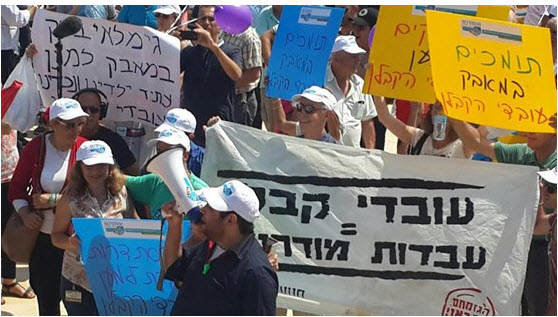Every day more government workers are rushing to join driving test examiners who continue to protest the Transport Ministry’s plan to authorize the privatization of driving license testing. Several weeks ago, the ministry advertised a tender for private groups to test prospective drivers on their on-road skills. According to Histadrut Chairman Avi Nissenkorn: “We cannot sit back while the government marches towards the total outsourcing of jobs that have traditionally been done by government workers. The attempt to outsource the examiner jobs is part of a wider trend that workers cannot accept. We will not allow them to be harmed.”
Among the workers joining the protest are employees of the Health Ministry’s administrative offices. Health Ministry offices will operate, but anyone with appointments at ministry offices will find their appointments canceled. Port workers have also declared a work slowdown and will randomly shut down operations, causing delays in the import of goods. In addition, workers at Employment Bureaus, several government-sponsored research offices, and other units will participate in protest work actions.
Workers at Israel’s licensing bureaus, which process and issue licenses to drivers of both private and commercial vehicles, will continue their current support for the driving test examiners by conducting business erratically, a spokesperson for the union representing the bureau workers said. This means that bureau workers will not adhere to regular office hours and the decision to shut down an operating licensing bureau is liable to be made spontaneously.
In addition, branches of the National Insurance Institute (NII) have been closed, apparently until this coming Sunday, as workers protest a lack of personal security for staff in the offices. Police decided last week to redeploy officers who have in the past been assigned to the NII offices to provide protection to the staff there. The police contend that there is no need for officers to be stationed at the offices, as the job could be done by private security guards. However, following the workers’ action, next Sunday the police officers are scheduled to be reintegrated in their role at the NII branches.
The Histadrut Labor Federation has also approved a series of industrial disputes, including one by workers at the Ministry of Agriculture and Rural Development, over a decision to privatize and move the well-know Vulcani Institute from the center of the country to the north. The Vulcani Institute Agricultural Research Center serves as the research arm of the ministry and provides research opportunities for local and international scientists at post-graduate levels, as well as educational opportunities for Israeli and international youth, farmers and scientists. The organization supports Israeli agriculture research, focusing on plant and animal sciences, plant protection, soil and environmental sciences, food science, and agricultural engineering.
Additional disputes approved during the past week by the Histadrut have included that of 6,000 employees of the Chinese-owned Tnuva dairy enterprise, Channel 2 Television and Radio, and the Port Authority, as well as veterinarians employed by local authorities.
Social Workers Protest Increasing Violence Directed Towards Them
Social welfare departments shut down their offices and services provided by social workers in the education and health systems were not conducted last week as social workers around the country went on strike to protest the sharp increase in violence being directed at them. The strike was called following an incident last week in which dozens of shots were fired at a car belonging to Hadija Abu Gzallah, a social worker in Umm el-Fahm.
Two years ago, the Silman Committee, headed by Yossi Silman, then director-general of the Ministry of Welfare, released findings regarding the status and condition of social workers in Israel. The report found that social workers are viewed in a negative light and are regularly subject to hostility including threats communicated via the Internet and incidents of threats of or actual violence in the context of court cases. In light of the hostile work environment, the Silman committee expressed concern that social workers are “running away” from making difficult decisions, even to the extent that they are afraid of issuing orders intended to protect children at risk, thereby seriously compromising the basis of their work. Since the issuing of the report, the social workers have claimed that they continue to be victims of violence and have demanded better protection.



